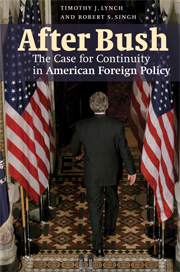Book contents
- Frontmatter
- Contents
- List of figures
- Acknowledgements
- Introduction: Winning the Second Cold War
- Chapter 1 Bush and the American foreign policy tradition
- Chapter 2 The constitution of American national security
- Chapter 3 The Second Cold War on Islamist terror: negative audits
- Chapter 4 The Second Cold War on Islamist terror: a positive audit
- Chapter 5 Iraq: Vietnam in the sand?
- Chapter 6 The Middle East: reformation or Armageddon
- Chapter 7 Frineds and foes after Bush
- Chapter 8 The emerging consensus at home and aborad
- Conclusion: The case for contiuity
- Notes
- Bibliography
- Index
Chapter 4 - The Second Cold War on Islamist terror: a positive audit
Published online by Cambridge University Press: 22 September 2009
- Frontmatter
- Contents
- List of figures
- Acknowledgements
- Introduction: Winning the Second Cold War
- Chapter 1 Bush and the American foreign policy tradition
- Chapter 2 The constitution of American national security
- Chapter 3 The Second Cold War on Islamist terror: negative audits
- Chapter 4 The Second Cold War on Islamist terror: a positive audit
- Chapter 5 Iraq: Vietnam in the sand?
- Chapter 6 The Middle East: reformation or Armageddon
- Chapter 7 Frineds and foes after Bush
- Chapter 8 The emerging consensus at home and aborad
- Conclusion: The case for contiuity
- Notes
- Bibliography
- Index
Summary
You may not be interested in war, but war is interested in you.
Leon TrotskyWar is an ugly thing, but it is not the ugliest of things. The decayed and degraded state of moral and patriotic feeling which thinks that nothing is worth war is much worse.
John Stuart Mill1If you are a reader of the Harry Potter books, you might describe this as the war that must not be named.
US Republican aide, 2007Al-Qa'eda brain surgeons fail to blow up large car full of petrol.
Spoof headline, Spectator, July 2007Is the war on Islamist terror working? In 1952 a similar inquiry was made of the First Cold War: are we winning? In this chapter we run an interim audit and argue that declarations of victory, as in the 1950s, are premature but that the United States is winning. At the very least the war has been instrumental in denying further triumphs to the enemy. The US has not yet won the war on terror, but the manner and method of its fighting has made future 9/11s (and worse) less likely, not more. For this reason of fundamental utility, the next administrations – Democratic or Republican – will tweak but not transform the design George W. Bush put in place. As with the First, the Second Cold War commands a domestic consensus that his successors will work with and within.
- Type
- Chapter
- Information
- After BushThe Case for Continuity in American Foreign Policy, pp. 111 - 146Publisher: Cambridge University PressPrint publication year: 2008



